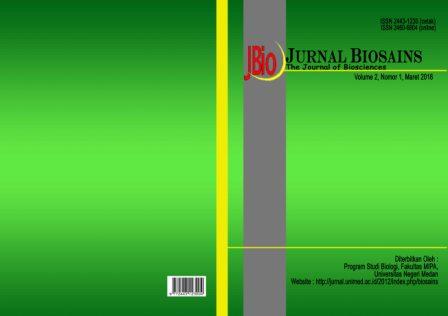Pengaruh Media Starter Dari Daging Nanas, Bonggol Nanas Dan Kulit Nanas Terhadap Kualitas Nata De Coco
DOI:
https://doi.org/10.24114/jbio.v2i1.4024Abstract
Penelitian ini bertujuan untuk Mengetahui Pengaruh Media Starter Dari Daging Nanas, Bonggol Nanas dan Kulit Nanas Terhadap Kualitas Nata De Coco. Metode yang digunakan dalam penelitian ini adalah Rancangan Acak Lengkap (RAL) dengan 3 faktor, 3 perlakuan dan 3 kali ulangan. Parameter yang diamati adalah ketebalan nata de coco, berat nata de coco dan uji organoleptik nya terhadap tektur dan warna nata de coco. Data yang diperoleh diolah menggunakan Rancangan Analisis Ragam (ANAVA) pada taraf 1% dan 5%, berpengaruh nyata atau tidak berpengaruh nyata. Hasil Penelitian menunjukkan bahwarata-rata ketebalan nata de coco dari media starter daging nanas sebesar 1,36 cm, bonggol nanas sebesar 1,5 cm, dan pada media starter dari kulit nanas sebesar 1,4 cm. Hasil rata-rata dari Berat nata de coco dari media starter daging nanas diperoleh 1.226gram, pada bonggol nanas diperoleh 1,350 gram, dan pada media starter dari kulit nanas diperoleh 1.325 gram. Kata kunci : Tanaman nanas, nata de coco, media starterDownloads
Published
Issue
Section
License
For Authors Jurnal Biosains agree to the following terms:
Authors retain copyright and grant the Jurnal Biosains (JBIO) right of first publication with the work simultaneously licensed under a Creative Commons Attribution License (CC BY-SA 4.0) that allows others to share (copy and redistribute the material in any medium or format) and adapt (remix, transform, and build upon the material) the work for any purpose, even commercially with an acknowledgement of the work's authorship and initial publication in JBIO (Jurnal Biosains)
Authors are able to enter into separate, additional contractual arrangements for the non-exclusive distribution of the journal's published version of the work (e.g., post it to an institutional repository or publish it in a book), with an acknowledgement of its initial publication in JBIO (Jurnal Biosains)
Authors are permitted and encouraged to post their work online (e.g., in institutional repositories or on their website) prior to and during the submission process, as it can lead to productive exchanges, as well as earlier and greater citation of published work (See The Effect of Open Access).


